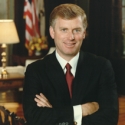 |
 |
|
|
|
Speeches |
|
|
Welcome By Senator Trent Lott
| << Previous Page | Speeches | Next Page >> |
Ladies and gentlemen, and our fellow Americans joining us through C-Span, welcome to the seventh presentation in our Leader's Lecture Series.
Two hundred and thirteen years ago this week, on September 17, 1787, the framers of the Constitution decided to create this United States Senate. We can only hope that we have lived up to their expectations of what this assembly could become.
By the same token, it's worth noting that, one hundred and eighty-six years ago this month, the Senate had to meet in a downtown hotel because this Capitol was a burned-out wreck as a result of an unauthorized visit by a group of heavily armed British tourists.
That, I suppose, is one way to get the Congress to leave town. I hope, however, that with the presidential election close at hand, today' s 1 06th Congress will be able to make a more graceful exit.
The problem is that these weeks before the end of a session tend to be times of tension and contention. That may be even more the case this year, when the political climate is likely to get hotter even though autumn is almost upon us.
But that is all the more reason to have a Leader's Lecture at this juncture. It brings us together across political and partisan lines. We come together to welcome back to the Senate a distinguished individual who has played a major role in the life of this institution.
Our speaker this evening stands in the tradition of the six men who have preceded him, beginning with former Senator and Ambassador Mike Mansfield. At the same time, he represents, in several ways, a departure from the past. Five of our previous speakers had been Majority Leaders, Minority Leaders, or both, but they had not held constitutional office in the Executive Branch. One speaker, President George Bush - that's with an H. W. - served here as President ofthe Senate during his vice presidency under President Reagan but was never an elected Member ofthis body.
Unlike those six gentlemen, our speaker this evening has been elected to high office in both the Executive and Legislative Branches and has been equally at home at both ends of Pennsylvania Avenue. He served eight years here as Senator from Indiana and four more in the Executive Branch as Vice President. That dual experience made him, on occasion, a bridge between the Senate and the White House, a role which worked to the considerable benefit of both institutions.
Another difference between our speaker and those who have preceded him in this role is generational. Even after his sixteen years in public office, beginning with two terms in the House of Representatives, and after another eight years as a private citizen, he is still decades younger than the other individuals we have honored here. There has been much talk of late about the passing of the torch of leadership from one generation to another. Our speaker demonstrates that it is no new phenomenon.
It is a rare political scientist who actually understands how great a difference personality can make in the workings of government. Our speaker this evening is a case in point. Although he has known his share of controversy, I doubt if any of his former colleagues, regardless of party, can recall an instance when he was deceptive, petty, or unfair. He was tough in debate, but never demagogic. His partisanship had limits, and his combativeness had humor.
The workload of modem government can be a burden that falls most heavily upon the families ofthose who serve in high office. It is to the lasting credit of our speaker that he set an example of putting first things first. As Vice President, to the consternation of this city's lobbying and partying interests, he simply refused to let their evening affairs interfere with dinner with the kids.
It's all a question of values, and that brings us to a topic which will always be associated with tonight's speaker. I cannot recall any speech, by any vice president, that has provoked the kind of national debate that was engendered by what came to be called the "Murphy Brown" speech. It was a thoughtful and challenging assessment of where our culture was running offthe tracks - and how we might get things to go back in the right direction. As one non-conservative journal later headlined, "Dan Quayle was right." Indeed, he was right about many things. About the downside of big government. About what Ronald Reagan called the Evil Empire. About the Arrow Strategic Defense System that saved Israel from Iraqi missiles during the Gulf War.
And about the crucial role of the family in everything from economic growth to welfare reform.
Henry Clay said he would rather be right than be president. With the same sense of priorities, our speaker has had what the poet John Greenleaf Whittier, called the" safe appeal of truth to time." In our speaker's own words, "With all my being, I have tried to stand firm, without wavering, for what I believe." That kind of commitment cannot be planned by pollsters or contrived by consultants. It has to come from within, and it is what makes a good Senator great.
Join me, please, in welcoming our former colleague, and our former President of the Senate, Dan Quayle.
[ Page 1 of 1 ]
| << Previous Page | Speeches | Next Page >> |